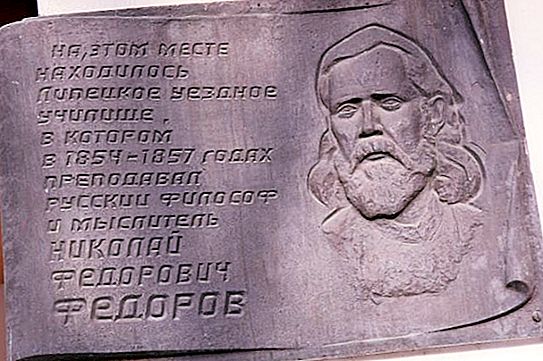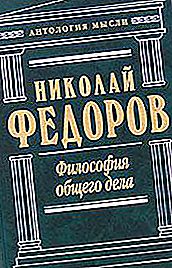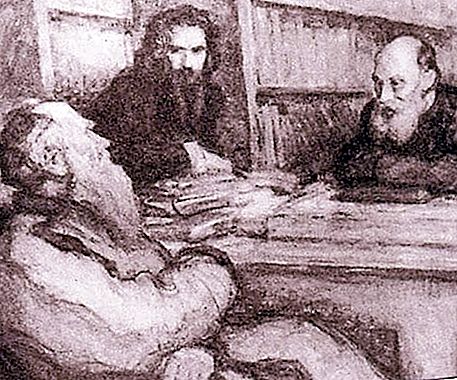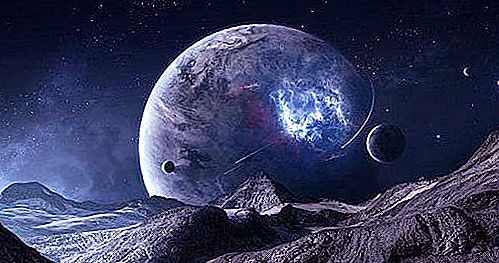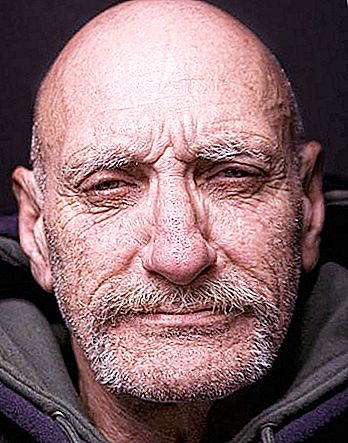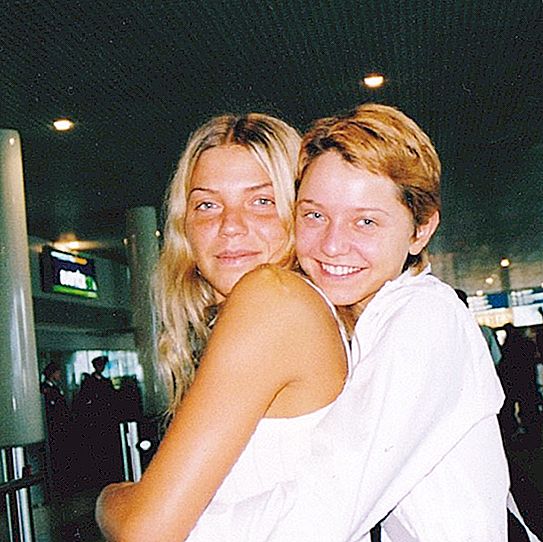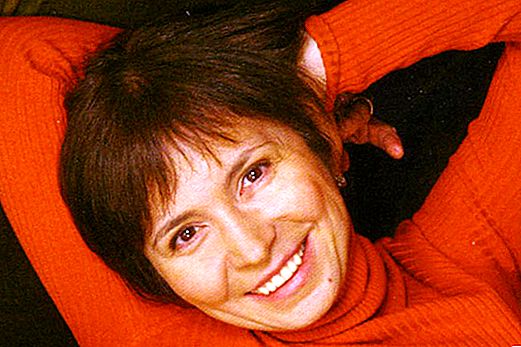The name of the Russian philosopher Nikolai Fyodorov has long been hidden from the general public, but he was not forgotten, because his ideas inspired such outstanding scientists as Konstantin Eduardovich Tsiolkovsky, Vladimir Ivanovich Vernadsky, Alexander Leonidovich Chizhevsky, Nikolai Aleksandrovich Naumov.
Russian philosophers of the 19th century and the first half of the 20th Vladimir Solovyov, Nikolai Berdyaev, Pavel Florensky, Sergey Bulgakov and others highly appreciated the ideas of Fedorov, and Vladimir Nikolaevich Ilyin in the article "Nikolai Fedorov and the Monk Seraphim of Sarov" puts these two people on one common step, paying tribute to the high spirituality and true Christian holiness of Nikolai Fedorovich.
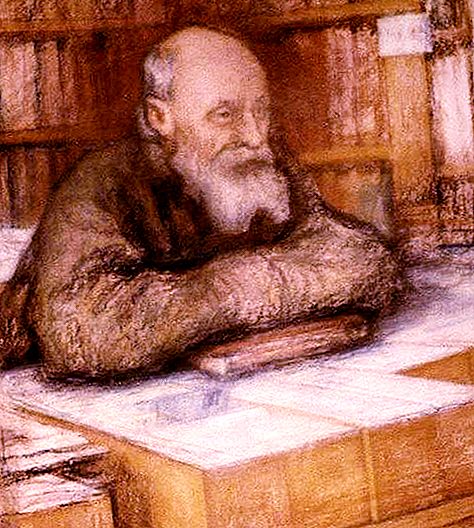
Childhood and youth
Biography of N. Fedorov contains a lot of white spots. We can’t say whether he was married or had children. It is only known that Nikolai Fedorovich Fedorov was born on May 26 (June 7), 1829. Information about his mother was not preserved. He is the illegitimate son of Prince Pavel Ivanovich Gagarin. As illegitimate, neither Nikolai, nor his brother and three sisters had the right to claim the title and surname of his father. Fedorov was his godfather. From him he received his surname. Such situations at that time were not uncommon: a nobleman could fall in love with a peasant woman, but divorce and marriage to a woman of a lower class deprived many of the privileges of both spouses and their children.
As for the surname, after the flight into space of Yuri Gagarin, foreign media responded to this event with articles under the heading “Two Gagarin”, implying the real name of Nikolai Fedorovich. Sergey Korolev had a portrait of a cosmos philosopher in his office and, of course, deciding which of the guys to be the first to go into space, he could not help but think of a good sign.
Father, Prince Gagarin, did not conceal his extramarital affair from his brother - Konstantin Ivanovich Gagarin. He took part in the fate of his nephews. He undertook to pay for the education of Nicholas. There is no information about other children. Nikolai left his native village of Klyuchi (Tambov province, now Ryazan region, Sasovsky district), having reached school age, he moved to Tambov, where he entered a gymnasium.
Lyceum Richelieu
After graduating from high school in 1849, Fedorov went to Odessa. There he entered the famous Lyceum of Richelieu at the Faculty of Law. This is a very prestigious educational institution. In importance, it was in second place after the famous Tsarskoye Selo Lyceum. In terms of the composition of the subjects studied, the quality of the knowledge taught and the rules, it was rather a university rather than a lyceum. The teaching was conducted by professors. In the Richelieu Lyceum, children from the most generous and wealthy families studied. Nikolai studied in it for three years. After the death of his uncle, who paid for his studies, the young man was forced to leave the lyceum and begin an independent life. An illegitimate son, even endowed with great talents and high virtues, could not count on state subsidies in such an educational institution. However, three years of study were not in vain. The fundamental knowledge in the natural sciences and the humanities acquired at the Lyceum was very useful to the future philosopher, who laid the foundation for Russian cosmism.
Teacher and librarian
In 1854, Nikolai Fedorovich Fedorov returned to his native Tambov province, received a teacher certificate and was sent to the city of Lipetsk to work as a history and geography teacher. Until the late sixties, he was engaged in teaching at the district schools of the Tambov, Moscow, Yaroslavl and Tula provinces. From 1867 to 1869 he traveled to Moscow, where he gave private lessons to the children of Mikhailovsky.
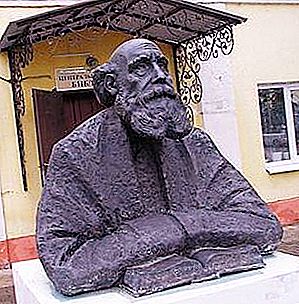
In 1869, Nikolai Fedorovich Fedorov finally moved to Moscow and got a job as an assistant librarian in Chertkov's first public library, open in the city.
Fedorov believed that the library is that cultural center that unites people who are not connected by family ties, but who are close in attraction to spiritual values - literature, art, science. He was against copyright law and actively promoted the ideas of various forms of book exchange.
Rumyantsev Museum and students
In the Chertkovsky library, Fedorov met the future father of astronautics - Konstantin Tsiolkovsky. Konstantin Eduardovich came to Moscow with the intention of getting an education at the Higher Technical School (now Bauman), but did not enter and decided to study independently. Nikolai Fedorovich replaced him with university professors. For three years, under the leadership of Fedorov, Tsiolkovsky mastered physics, astronomy, chemistry, higher mathematics, etc. The humanities, which, like the rest, were devoted to evening time, were not forgotten.
When, after a few years, the library was annexed to the Rumyantsev Museum, N. Fedorov made a complete cataloging of the joint book fund. In his spare time from his main job, he studied with youth. Nikolai Fyodorovich spent his modest salary on students, but he himself lived in the strictest economy, even to the point that he did not use public transport and walked everywhere.
The essence of cosmism theory
Nikolai Fedorov is considered the father of Russian cosmism. The philosopher argued that after Copernicus discovered the heliocentric system, medieval philosophy had to revise its ideas about the world order. Cosmic prospects posed new challenges for humanity. As Tsiolkovsky said: “The Earth is the cradle of mankind, but it’s not forever for him to live in the cradle!”
It should be noted that Fedorov designated science as philosophy as thought without work. In his opinion, this sooner or later leads to isolation from the subject of study and the denial of objective knowledge. Theoretical knowledge should be reinforced by practice, and its purpose should be to study nature, life and death in order to control it.
The Universe has been mastered in such a meager volume that the conclusion suggests itself: the Lord created such a huge Cosmos in order to place in it all the people who have ever lived, and those who are still born in the future. There is no other way to explain it. Under the influence of this conclusion, the Russian cosmism of Fedorov was born. Considering the Universe as a huge space, only the microscopic part of which is occupied by mankind, the philosopher associated this unnatural imbalance with the Christian doctrine of resurrection. The free space was prepared by the Creator to accommodate billions of people who have ever lived on Earth. You can read more about this in the collection of works by Nikolai Fedorovich, united by the title Philosophy of the Common Affair. The development of human civilization should be aimed at the exploration of outer space, at the return to the physical life of people who lived before and are now buried. In this regard, it is necessary to create a new ethics that allows everyone to live in peace and harmony.
New ethics
Nikolai Fedorovich was a religious man. He participated in the liturgical life of the Church, observed fasts, regularly confessed and communed. In his opinion, a new ethics should be developed on the basis of the Christian doctrine of the Trinity of God. Just as the three different Essences of God — the Father, the Son, and the Holy Spirit — interact harmoniously, so divided humanity must find a way of peaceful coexistence. The Divine Trinity is the antithesis of the eastern mentality of the dissolution of personality in the collective and Western individualism.
The best basis for building new relationships is ecology. Caring for nature, studying its laws and managing them should become the basis for uniting people of different nationalities, professions and level of education. Science and religion have much in common. The Christian doctrine of the impending resurrection of the dead should be put into practice by scholars.
Resurrection of the Dead
What is universal resurrection, according to Fedorov, is the rebirth or recreation of people? The philosopher argued that death is evil that people must eradicate. Each person lives due to the death of his ancestors, therefore, is criminal. This state of things must be corrected. Bills should be paid by resurrecting the dead. The idea of resurrection should become a catalyst uniting representatives of science from all countries of the world for the sake of one common cause.
The resurrection mechanism is based on the laws of physics - each physical body consists of molecules and atoms that are held together by the energies of attraction and repulsion. All objects emit such waves. These phenomena should be studied and thoroughly investigated for the restoration of physical matter, that is, for the cultivation of past inhabitants of the planet from preserved biological material or for collecting the energies that people consisted of in order to materialize them in this way. There may be more resurrection options, as Fedorov suggests.
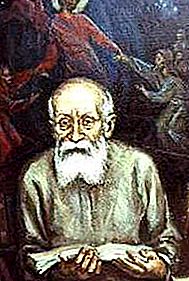
The philosophy of his model for the development of society includes the upbringing of new relationships between people. Since paradise is not the ephemeral space where the souls of the righteous dwell, and not the abstract peace of the soul, resigned to reality, which he does not have power to change, but the real physical world, it is necessary to remake or educate people so that they forever say goodbye to dependence on vices known as hatred, envy, love of money, despondency, pride, idolatry, etc. It is also necessary to prevent people from suffering from physical irritants, such as illness, cold, heat, hunger, and others. This is a job for both scholars and clergy. Science and religion must come together.
Nikolai Fedorovich drew two possible ways of development of human civilization.
The relationship between the sexes
Nikolai Fedorov did not ignore this side of human relations. In our world, in his opinion, the cult of women and carnal love reigns. Relationships are driven by sexual instinct. More sensuality and very little empathy.
Marital relations should be built on the model of the Divine Trinity, when the union is not a yoke, and the individuality of the person is not a reason for hatred. The love between men and women should resemble the love of children for their parents. However, not only lust, but also its opposite, asceticism, is not allowed, as total egoism and absolute altruism are unacceptable.
Childbearing will be perceived as the re-opening, that is, the creation of people for new worlds. Our sexual sensuality is an instinctive escape from death, and birth, in the current view, is the opposite of dying. Love for ancestors will supplant the fear of one’s own death and will be transformed into the recreation of fathers.
The first path that humanity can take
The intelligentsia and scientists around the world will work to recreate the human gene pool. The armed forces will no longer be used for aggressive, mutually destroying purposes, but will be used to counter the elemental forces of nature, i.e. floods, earthquakes, volcanic eruptions, forest fires, etc.
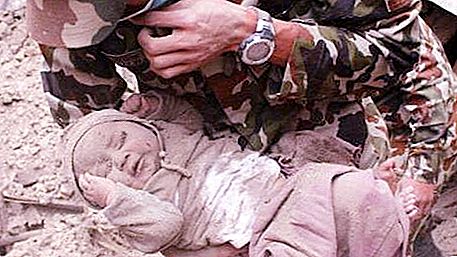
Industry will cease to manufacture products that can be conditionally called adult toys. The main production will be transferred to the countryside. There life will develop. Cities give birth to people of a consumer warehouse, prone to a parasitic way of being. Life in cities deprives them of healthy aspirations, limits them and makes them not only flawed, but unhappy.
Universal education is a prerequisite for the implementation of the resurrection plan.
Public administration will be carried out by the monarch, connected with his people by relations not of Caesar and his subjects, but of the executor of the will of God for the sake of universal good.
Another way
Nikolai Fedorov also suggested another way of development of human civilization, which will lead us not to immortality and the resurrection of the dead, but to the Last Judgment and fiery hell. Russian cosmism is a real concept that has nothing to do with the utopian fantasies of science fiction writers. Fedorov’s picture of the world looks incredibly believable, although he lived in the era before the scientific and technological revolution.
The Doomsday will lead to a hypertrophied sense of self-preservation, which will prevail over common sense. This will arise as a result of a departure from God, in the loss of faith in His providence, will, care and love for people. From a misunderstood sense of security, people will artificially synthesize food. Lust will prevail over love, unnatural marriages without childbearing will begin to appear. Animals and plants that pose a health hazard will be destroyed. They will stop releasing aircraft. In the end, people will begin to exterminate each other. Then the Day of Wrath will come.
It is amazing that all this was written in the XIX century - Nikolai Fedorov died on December 28, 1903.
Sciences born from the teachings of Fedorov
Without knowing it, Nikolai Fedorovich Fedorov inspired Konstantin Tsiolkovsky to devote his life to creating a new branch of science and technology - cosmonautics.
The world order formulated by Nikolai Fedorovich conquered the minds of many of his contemporaries. It was Fedorov’s ideas that generated such sciences as space and heliobilogy, aeroionification, electrohemodynamics, and so on. According to scholars involved in the legacy that Moscow Socrates left, as friends and students called Fedorov, he outlined the vector and gave impetus to the development of universal knowledge for many centuries to come. With his submission, a new view was born of the evolution of mankind, as an active process carried out by the people themselves, working to create the ideal noosphere.
Most of the notes that N.F. Fedorov made for his students were preserved. Nikolai Fedorovich did not publish his thoughts. His works were preserved by numerous students. Nikolai Pavlovich Peterson and Vladimir Alexandrovich Kozhevnikov systematized them and published them in 1906. The entire circulation was sent to libraries and distributed free of charge to everyone.
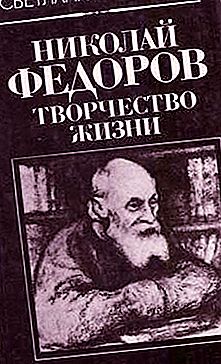
During his lifetime, Nikolai Fedorovich never took pictures and did not allow himself to draw. However, Leonid Pasternak still secretly made one portrait. We placed it at the beginning of the article.

